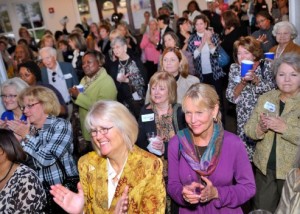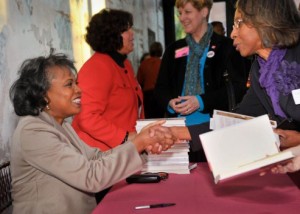It’s the 20th anniversary of Anita Hill’s truth-to-power moment (I’ll dub it Hill’s personal “power to” moment) confronting then U.S. Supreme Court Nominee, now Justice Clarence Thomas, that changed the culture’s understanding about sexual harassment forever. I delayed the Friday Round Up in order to share two important events that I participated in last week, along with a selection of related news reports and commentary.
Murmurs of recognition rippled across the sold out “Anita Hill 20 Years Later” conference in New York’s Hunter College Auditorium October 15 when conference organizer Letty Cottin Pogrebin (read her thank you message to Anita here) opined that every woman old enough to remember the Clarence Thomas confirmation hearings had probably experienced her own Anita Hill moment. (Stop here, readers, and conjure yours.)
- The moment when she realized there was something fundamentally wrong with the uninvited groping, touching, or sexualized comments she was being subjected to at work, on the street, at family gatherings.
- The moment when such behavior shifted in her mind from “just the way things are” to “sexual harassment.”
- The moment when she decided not to take it any more. For me it was not just one moment but a slow-growing awareness that I had cultivated the art of slithering away from unwanted male touches when I would be better served to call them out on the spot. And that I had the power to do just that.
- Here’s a sports journalist’s moment I encourage you to post yours in the comments section below.
- And I could not be prouder of young feminists Jamia Wilson (now Vice President of Programs at the Women’s Media Center) and Julie Zeilinger (founder of the f-Bomb blog) declared that the next generation carries on the fight for social justice across gender and race.
 Hill’s “Power To” Moment Changed Everything
Hill’s “Power To” Moment Changed Everything
The term “sexual harassment” as a legitimate subject for prosecution entered the public lexicon because Anita Hill courageously described to the Senate Judiciary Committee and, via television to a riveted world, unseemly behavior she had experienced while working for George H. W. Bush’s nominee for the highest court in the land, Clarence Thomas.
The shabbiness of Hunter’s auditorium contrasted with the elegance I remembered Hill exhibiting when she calmly faced the then all-male (it was 1991 after all!) and seemingly all-powerful Judiciary committee. Watch the hearing clips near the beginning of the c-Span conference video above. The senators behaved even more assholishly toward Hill than I remembered.
 What Has Been the Impact of Anita Hill?
What Has Been the Impact of Anita Hill?
This piece in The Root by Robin D. Stone describes the impact of Hill’s battle on the next generations of women.
Linda Meric, Executive Director of 9to5, National Association of Working Women, says harassment persists despite the advances.
Even Saturday Night Live got into the act — parody being a sure sign that something big is taking place in the culture. .
I told over 200 women lawyers and judges assembled at the South Carolina Women Lawyers Association “Women Lawyers and Leadership” Conference last Friday (check out the amazing panel I was on with Vickie Pynchon, Gloria Steinem, Jamia Wilson, and Shelby Knox), that Joe Biden would not be vice president today if he had not mended the egregiously sexist behavior he exhibited as Judiciary Committee chair. Political pressure from women’s groups in the wake of the Thomas hearings led directly in my view to Biden’s sponsorship of the 1994 Violence Against Women Act.
Because that’s how things work in politics. Like the laws of physics, every action creates an equal and opposite reaction, and Biden knew his political future depended on mending fences with the women and politically organized women’s groups that were beyond outraged at how Hill, and by extension, they, had been treated by the committee. In fact, the blowback was so immediate and strong that within a month after the hearing, Congress passed a law allowing sexual harassment victims to seek reparations including damages, back pay, and reinstatement if they had been let go.
 We Still Believe Anita Hill—and Take Action
We Still Believe Anita Hill—and Take Action
Though Biden voted no on Thomas’s nomination he had pushed the hearings to a quick conclusion without allowing testimony from additional women who wanted to testify that they had also been sexually harassed by Thomas.
I sat with friends Nancy Becker and Ruth Mandell at the Hunter conference. They said that many women had told them things are worse due to Anita Hill raising the issue of sexual harassment. That’s a common fear-based reaction.
But one measure of progress is documented in the 10/21/11 New York Times editorial “Sexual Harassment 20 Years Later.” Despite warning that because of how Hill had been publicly treated by the senators, fewer women would come forward to report sexual harassment, claims increased by 50 % the year after the hearings.
And in FY 2010, claims of sexual harassment brought to the E.E.O.C. and state and local fair employment commissions were almost double that of 1991. And new organizations like Hollaback! are springing up to empower women—and men—who are sexually harassed on the street or elsewhere.
 In South Carolina, the night before the SC Women Lawyers’ conference, I had the pleasure of attending the 20th annual “We Believe Anita Hill” party that started the year of the Thomas hearings and this year was headlined by Hill herself and drew over 500 women and a few men. These words from their history are the important part—a call to action which is the best way to honor Anita Hill’s legacy:
In South Carolina, the night before the SC Women Lawyers’ conference, I had the pleasure of attending the 20th annual “We Believe Anita Hill” party that started the year of the Thomas hearings and this year was headlined by Hill herself and drew over 500 women and a few men. These words from their history are the important part—a call to action which is the best way to honor Anita Hill’s legacy:
A group of local women who shared the outrage wanted to channel the energy of those many powerful women. Early efforts involved women’s policy work, lobbying on women’s issues, and political campaign organization…The Anita Hill Wake-Up Call Anniversary Celebration is an annual reminder of the outrage, of the effect of the different perspectives of men and women, of the need for more women in politics and other policy-making positions, and of the need to get involved, to stay involved, and to stay in contact with other strong women of all ages and backgrounds.
Gloria Feldt
Latest posts by Gloria Feldt (Posts)
- This Blog is No Longer Active… - March 17, 2014
- Women’s Equality Day and the Civil Rights March - August 26, 2013
- Stuck? Change Your Relationship With Power - July 21, 2013





 "Female Writers Kicking Up Literary Dust"
"Female Writers Kicking Up Literary Dust"
7 Responses to Friday Round Up on Monday: What Was Your Anita Hill Moment?